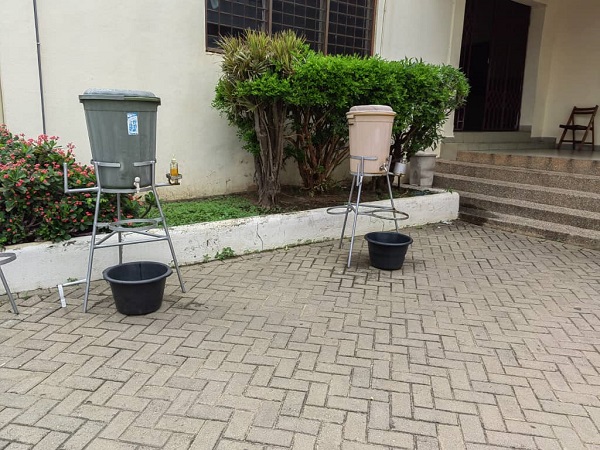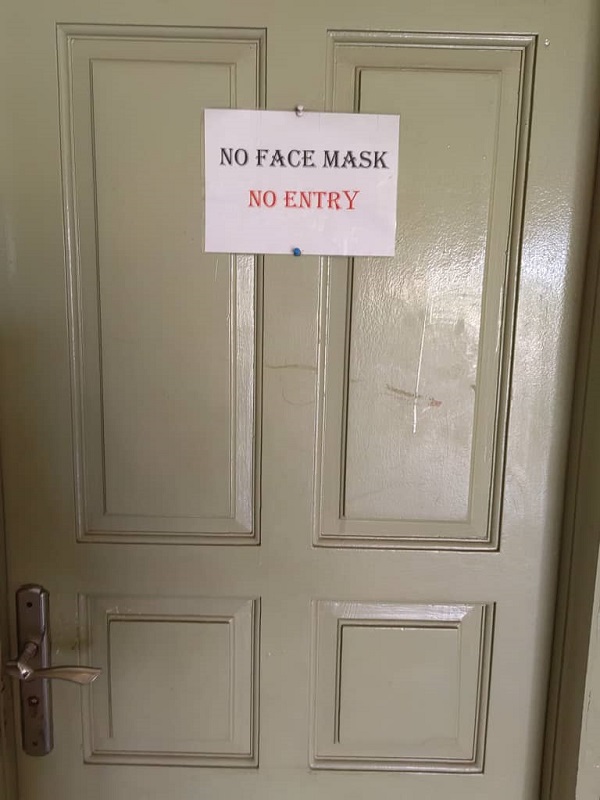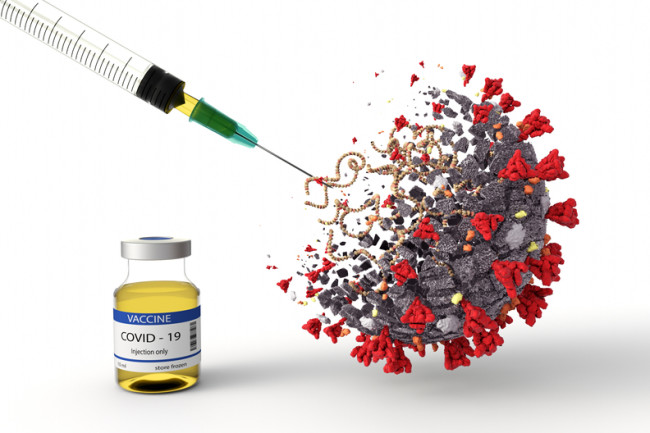The Mirror's Health , Lifestyle and Fashion

COVID-19 strikes harder: Veronica buckets, face masks, sanitiser no more big deals
The sudden increase in cases has been linked to the low usage of face masks, which is no longer mandatory, while the protocols of washing hands and using sanitisers have all reduced drastically.
Advertisement
Last Monday and Tuesday, this reporter visited some schools, banks, hotels, malls and churches in Accra and it was clear that the COVID protocols had been pushed to the background.
The Veronica buckets, checking of temperatures, handwashing basins, soaps and sanitisers were neither being used nor enforced, the same as it was a few months ago at hotels, banks and other corporate institutions.
The few Veronica buckets and mini polytanks which were seen had no water stored in them and soap for washing was unavailable. At some of the banks visited, the sinks placed in front of the banking halls were all dried up with some getting rusty.
The act of placing tissues, sanitisers and hand liquid soaps in the dispensers at almost all the malls were all missing. Besides, some of the walkthrough sanitisation booths at the hotels were no longer in operation.

At most of the public primary and secondary schools visited, most of the schoolchildren were not wearing face masks. However, at the Immanuel Methodist International School at East Airport, there were two Veronica buckets in front of the school with hand washing soap and sanitiser. All the classroom doors had the signage ,“No mask, No entry” while teachers and cleaners were all masked up.
According to the Ghana Health Service, currently, there are 165,749 confirmed cases, 1,556 active cases and 203 new cases as of the time of going to press. The total number of recoveries and discharges were 162,744 and 1,449 deaths.
Explaining the reason behind the increasing number of cases, Dr Emmanuel Addipa-Adapoe, a member of the COVID-19 Management Team at the Greater Accra Regional Hospital, said the sudden increase had to do with the rainy season which is usually the flu season.
“The flu viruses thrive in this period. This includes the other coronaviruses that originally cause flu. Omicron, the predominant variant of the SARS-CoV-2, presents with flu like symptoms.”

Dr Addipa-Adapoe indicated that the relaxation of the infection prevention protocols had also not helped with the situation.
“Undoubtedly, the serpent bites when the hedge is broken. Same is true for infectious disease transmission. People get infected more when the barrier of protection is removed, the infection goes up. The Veronica buckets filled with water with soap dispensers for hand washing have all disappeared from the entrances of service delivery points.”
“Hand sanitisers are no longer carried, nor are they displayed, let alone used at functions. Masking up is no longer mandatory. This statement has been misconstrued to mean that one needs not mask up at all - even in places that easily predispose us to the infection, like hospitals, shopping malls, banking halls, church auditoriums, mosques, funerals, events in enclosed buildings, lecture halls, classrooms, among others,” he lamented.

He said the cessation of testing at the ports of entry had also compounded the situation. According to him, the land ports and Kotoka International Airport had been opened, but the COVID-19 Antigen testing at the airport had ceased for the vaccinated even though they could still test positive.
“The proof of vaccination is no panacea for a COVID-19 free life. Whether the mandatory 14-day isolation for unvaccinated returnees is being adhered to is another matter. As for the land ports, monitoring of immigrants is almost non-existent,” he pointed out.
Cases of children increasing
Touching on why a lot of children were being infected this time, he said the laxity in the COVID-19 infection prevention protocols in most schools was a major factor.
“The school authorities are no more enforcing the protocol of handwashing with soap under running water, no hand sanitising, no more masking up in classrooms and prep times and no physical distancing.”
Dr Addipa-Adapoe said vaccine hesitancy among some children of school-age could be attributed to the influence of their parents’ decision not to take the vaccine. “Unfortunately, since vaccines are not rolled out yet for children below 15 years is equally a big challenge, especially when a number of children below 15 are being infected.
Vaccine hesitancy
Dr Addipa-Adapoe stated that vaccine uptake was gradually picking up, adding that the Public Health Directorate of the GHS had doubled its efforts to get the vaccines to the doorstep of the citizenry. However, he admitted there was still a lot of vaccine hesitancy, especially among the youth.
“As of May 29, 2022 the total population fully vaccinated stands at 6,410,470 (20.6 per cent) and those who have received at least one dose are 9,786,631 (31.5 per cent).
“The GHS must be commended for the door-to-door approach to the vaccination drive. The Ghana Infectious Disease Centre is fully open and receiving cases. Other isolation and treatment centres are also managing cases. Therefore, it is important to seek medical treatment and not hide due to stigmatisation.”

“Thankfully, most of the cases are mild. Therefore, the plan is for those infected to isolate at home after doing the baseline lab tests. They have to check their oxygen saturation and communicate with their healthcare provider daily until they see the doctor again after seven days.
If all is well, the client can de-isolate. Otherwise, the criteria for severe COVID disease is invoked per the assessment, and the patient is brought in for admission and close monitored until discharged,” he said.
He said most of the severe cases that were on admission currently, and had prolonged hospital stay, were those who were unvaccinated.
Things to look out for
The symptoms are mostly flu like: the top five are runny nose, headache, mild or severe fatigue, sore throat and sneezing
Other common COVID-19 symptoms, like cough, fever, and loss of smell or taste, are still important signs to watch out for with the Omicron variant.
“Think COVID when you have a fever, or have had a history of fever with upper respiratory symptoms,” he cautioned.
Things to do to remain safe
Be safe to save others
1. Observe the Infection Prevention Protocols:
a. Wash hands with soap under running water
b. Mask up
c. Sanitise hands periodically
d. Avoid touching face, nose, eyes and mouth with unwashed hands
2. Get vaccinated! It is safe.
If you're yet to vaccinate, get it!.
If you've had one shot, which was not the Jansen brand , get the second shot!
If you're fully vaccinated, get the booster dose!
Writer’s Emai: [email protected] or [email protected]





